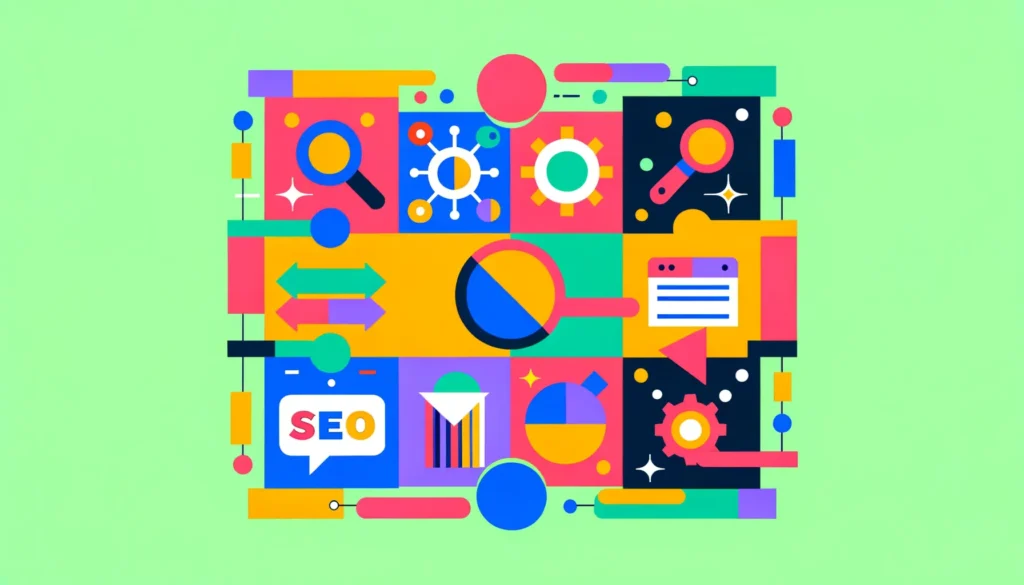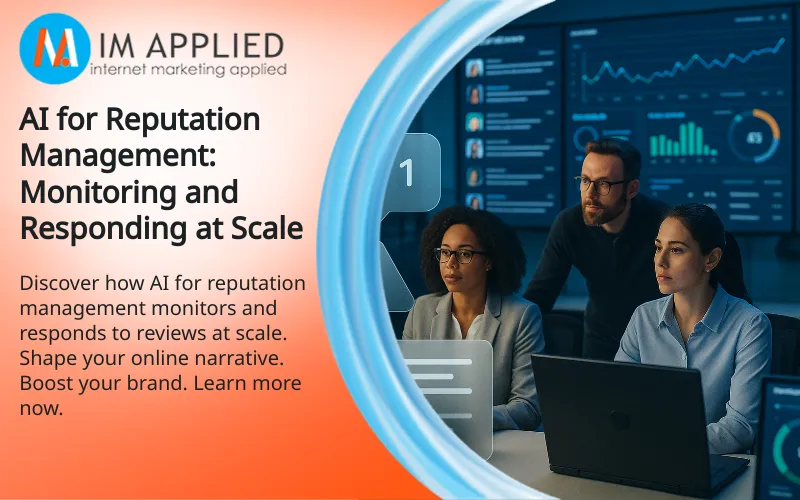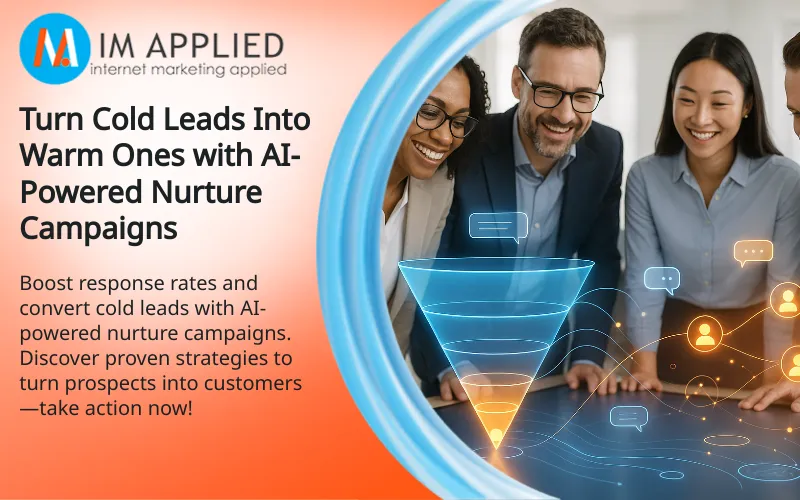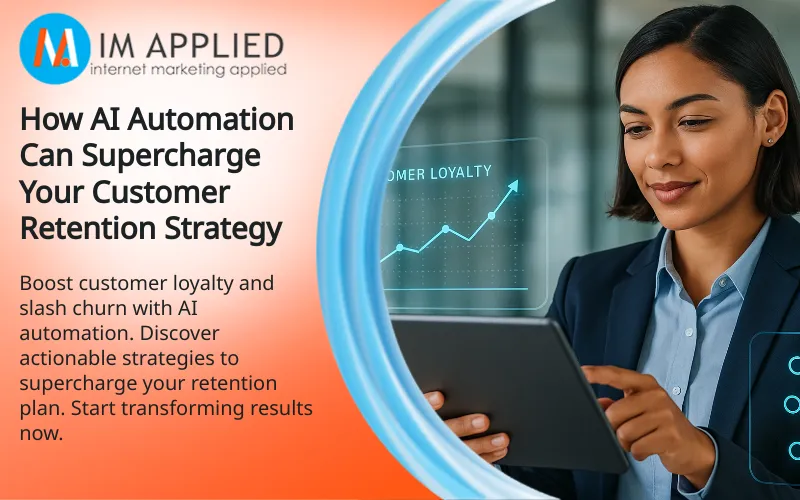Harnessing AI and SEO for Small Business Success
Karl Marais | 24 April 2025
AI and SEO are game changers for small businesses looking to rise above the noise. By optimizing your online presence strategically, you can drive traffic, boost sales, and grow your bottom line efficiently. This article explores how leveraging AI and SEO can position your business for success and sustainable growth.
The Role of AI in Modern Business
AI is reshaping business operations, making efficiency accessible even for small enterprises. Tasks that once drained time and manpower are now streamlined through automation. From managing repetitive processes like data entry to scheduling, AI frees up valuable human resources for strategic growth. Small businesses leveraging AI automation can cut operational time and focus sharply on what drives revenue.
A standout advantage is data. Whether you’re sifting through sales data or tracking website traffic, AI transforms mountains of raw information into actionable strategies. Need to know what your audience responds to? AI tools can help uncover insights you may not have been aware of. This means targeting the right customers precisely instead of blindly marketing to small businesses.
And let’s talk about personalizing customer experiences. AI takes this to a whole new level. By analyzing user behavior it enables you to offer highly tailored recommendations, messages, and even solutions. Customers crave personalization; AI helps you deliver that without hiring a massive team. Whether you’re running targeted email campaigns or customizing website content, businesses using AI often see increased engagement and customer satisfaction.
Small businesses see these benefits across industries like e-commerce, service-based companies, and local shops. AI adapts to your business size and growth stage, ensuring accessible innovation. Integrating machine-learning tools into your strategy isn’t just smart—it’s essential. For a more in-depth look at how AI affects SEO, check out this resource on the impact of artificial intelligence on SEO strategies.
Integrating AI Tools in Your Small Business

Integrating AI tools into your small business doesn’t have to feel like you’re navigating a maze. Many AI tools are out there, and many SEO tools have integrated AI into their existing systems. New AI tools are always popping up left and right for more niche needs. To find the right AI tools for your business’s systems, clarify what you want to achieve.
Are you looking to streamline customer service, supercharge marketing efforts, or make data-driven decisions? Pinpointing your goals is crucial to choosing the right AI software. Look for platforms purposely built for small businesses that are straightforward and fit your budget. Overcomplicated tools might sound fancy, but they’ll bog your team down instead of helping.
Once you’ve picked a tool, commit to training your team to use it effectively. Even the most intuitive systems require some onboarding to maximize their potential. Avoid overwhelming your team by providing small, digestible training sessions on real-world applications. When people understand how the tool simplifies their tasks, they’ll naturally adopt it into their workflow.
AI can deliver enormous value if you let it guide your decisions. For example, AI analytics tools can uncover patterns in customer behavior that you might miss manually. This insight can steer your marketing strategy, helping you create campaigns that resonate with your audience. Additionally, tools such as chatbots provide nearly instant customer service, reducing delays and increasing customer satisfaction. When an FAQ is just a quick reply away, you’re solving customer issues and freeing your team to focus on the bigger issues that require a human to solve.
Integrating AI ultimately helps small businesses move smarter, not just faster. Finding the right tool alongside proper training can enhance performance across various fronts. To explore tools with cross-channel strategies, take a look at this guide on the top SEO tools to align with your business objectives.
Measuring Success and ROI with SEO and AI

Analyzing metrics is vital for seeing real progress in your AI and SEO efforts. Begin by monitoring traffic growth. It’s not just about more visitors; it’s about attracting the right audience. Are they coming from the geographic locations you’re targeting? Are they spending meaningful time on your site? Data from tools like Google Analytics helps you evaluate whether your strategies resonate with the right crowd.
Next, keep an eye on conversion rates. Traffic without conversions is wasted potential. Whether you’re aiming for online sales, lead submissions, or appointment bookings, every business should clearly define its conversion goals. Then, compare your numbers pre- and post-campaign. Small tweaks, like optimizing calls-to-action or using AI to enhance personalized recommendations, often lead to noticeable bumps in conversion rates.
Customer engagement is another goldmine of insight. Are visitors bouncing from your site? Analyze if pages drive interest or leave users frustrated. AI tools can help identify patterns in behavior and even suggest tweaks to enhance engagement. For instance, applying insights from UX analytics ensures your layout meets user expectations while aligning with SEO guidelines for search intent clarity.
Prioritize creating benchmarks tied to your business objectives. Maybe it’s increasing qualified leads by 20% in six months or achieving higher keyword rankings. Stay focused on results that impact revenue. Explore how to conduct a comprehensive SEO audit for helpful guidelines on measuring whether your SEO strategies are hitting the right notes. It ensures you’re not just busy but productive.
Overcoming Common Challenges in AI and SEO Implementation
Let’s be real—small businesses often stumble when diving into AI and SEO. The challenges aren’t always about lack of ambition. Hurdles like tight budgets, tech integration headaches, and limited know-how create bottlenecks. But the good news is that smart solutions can dissolve these issues faster than most expect.
First, for businesses juggling thin budgets, start by focusing on high-impact, low-cost strategies, instead of worrying about. Every shiny tool, invest in a few essential ones. For SEO, use dependable free or low-cost platforms like Google Analytics to monitor performance without burning cash. As for AI, tools like chatbots or AI-driven email marketing can be affordable, or even free for older models.
Tech integration can intimidate small businesses that aren’t as computer savvy, but it doesn’t have to. Choosing tools that play well with your current systems can save time and frustration. If you’re thinking about implementing AI or updating your website for SEO, use tools prioritizing seamless compatibility. While at it, ensure the site layout is optimized for search engines. For insights, check out this resource on how to design an SEO-friendly website structure.
Lastly, let’s tackle the skills gap. Hiring an expert might seem costly, but outsourcing specific tasks can often be more economical than fumbling through mistakes. If hiring isn’t an option yet, invest in cost-effective online courses or free resources. Building skills gradually empowers you to own your strategies instead of constantly depending on external help.
The takeaway? Tight budgets, limited skills, or integration struggles aren’t deal-breakers. Start small, work smart, and let adaptability guide your AI and SEO efforts. You’ll pave the way for measurable progress, despite limited resources.
Defining ROI: Brand, Visibility, and Experience

Defining ROI for small businesses often means more than just calculating dollars spent versus dollars earned. Some businesses thrive on brand recognition, others prioritize visibility, and many target user experience as a driving force. AI and SEO strategies allow small businesses to achieve ROI by focusing on these diverse goals.
Think of a local café looking to deepen its community connection. Using AI to analyze customer reviews and behavior, the café discovered its customers loved their fresh pastries. With SEO, they emphasized keywords like “best fresh pastries near me” and featured engaging content highlighting their baking process. The result? They showed up more for what their customers were looking for.
Imagine a website that loads slowly or has no clear structure. Poor user experience can mean plummeting lead conversions. These businesses saw massive improvement in search rankings and client acquisition by applying AI recommendations to improve site speed and structured SEO techniques. For insights into enhancing site structure for SEO, check out how to design an SEO-friendly website structure.
Future Trends: Staying Ahead with AI and SEO
AI and SEO are evolving rapidly, and small businesses that recognize and leverage these trends will secure a strong edge. One emerging shift is the emphasis on **voice search optimization**. With the increasing use of voice assistants like Alexa and Siri, customers are now searching for information conversationally. Small businesses must adapt by incorporating natural language phrases into their SEO strategies, aligning content with how people speak rather than type. This can dramatically improve visibility in voice-activated search queries.
Another game-changer is AI-driven content creation. ChatGPT and other machine learning systems can generate articles, product descriptions, social media posts, and even customer service responses. This means reduced costs and faster output for small businesses without compromising quality. However, simply producing content isn’t the goal—strategically optimizing it for SEO remains key. AI tools can also assist with identifying high-performing keywords and trends, unlocking new opportunities for businesses to target specific audiences effectively.
Machine learning’s growing role in predictive analysis also deserves attention. These AI systems analyze patterns in customer behavior and refine marketing strategies in real-time. For example, they can predict what topics or products might resonate most with future customers.
And let’s not forget the urgency of mobile-first strategies and site performance optimization. Page speed and responsiveness directly affect rankings, with algorithms prioritizing seamless user experiences. Dive deeper into strategies like these by exploring how to design an SEO-friendly website structure. Adapting to innovation ensures that small businesses remain competitive in ever-changing marketplaces.
Taking Action
Taking action starts with clarity. Set clear, measurable goals for your SEO and AI initiatives. Are you aiming for more local foot traffic? Trying to generate more leads online? Whatever it is, define the “win” before you dive in. This will help you focus your energy and resources where they truly matter.
Next, assess your resources. Small businesses often grapple with limited time and budgets, but don’t let that hold you back. Start by identifying the tools you already use, whether that’s your website platform, email marketing tools, or analytics. Many foundational SEO tools are free or inexpensive. Meanwhile, AI tools like chatbots or content generators can quickly amplify your productivity without breaking the bank. Focus on integrating what makes the biggest impact on your goals, not just what sounds exciting.
Execution is key, but don’t get stuck waiting for perfection. Start small while keeping the long-term vision in mind. Experiment with changes like improving your site’s speed, optimizing local SEO, or introducing AI-driven solutions like predictive analytics. Incremental adjustments can rapidly lead to big wins.
Finally, stay curious and keep learning. SEO and AI are constantly evolving arenas. Dedicate time to updates from reliable sources and trusted blogs on thorough SEO audits. Continuous learning compounds over time, positioning you as an informed, competitive player.
When you’re ready to dial it up, don’t hesitate to consult experts. You don’t need to navigate it alone—resources like https://imappliedseo.com are designed to help small businesses like yours. Take action, track your progress, and keep refining your approach. That’s the recipe for long-term success.
The Importance of Partnering with Experts
Partnering with experts in AI and SEO is often the smart move. Running a business comes with complexities, and adding the ever-changing landscape of digital marketing can overwhelm anyone. This is where collaboration with agencies specializing in AI and SEO can make all the difference.
These agencies offer services like search engine optimization (SEO), search engine marketing (SEM), and content marketing tailored to your business goals. For example, SEO services help your business rank higher on search engines, driving more organic traffic. SEM combines targeted advertising with keyword strategies to provide instant visibility while maintaining cost efficiency. And then there’s content marketing—creating valuable and optimized content that connects with your audience and builds trust. These strategies can increase brand visibility, customer engagement, and higher conversions.
AI-powered tools also enhance their efficiency. Agencies leverage AI to generate analytics overviews, identify consumer behavior patterns, and automate tedious tasks. These insights allow them to refine strategies continuously, making campaigns more precise and impactful. Ultimately, such efforts boost your bottom line, transforming traffic and leads into loyal customers.
The best part? You don’t have to commit blindly. Many agencies offer a discovery call to assess your unique needs and challenges. For instance, businesses exploring SEO for growth might want to learn more about the value of SEO for small businesses. A deeper look at your goals and possibilities can reveal opportunities you may never have considered. Let the experts focus on the complex strategies while you concentrate on running your business.




